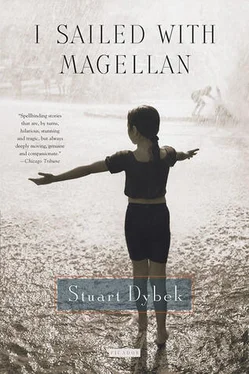Stuart Dybek
I Sailed with Magellan
For Adeline Dybek
1913–2003
In memory everything seems to happen to music.
— Tennessee Williams, The Glass Menagerie
Yo no digo esta canción
sino a quien conmigo va.
I shall never teach you this song
unless you sail away with me.
— Anonymous, “El Conde Arnaldos”
Once I was a great singer. Caruso Junior they called me, and Little der Bingle. Crooners like Bing Crosby and Sinatra were still big in those days. My repertoire included “Clang, Clang, Clang Went the Trolley,” the song behind my ambition to become a streetcar conductor. I knew the nameless tune my mother sang when we waited for the El: “Down by the station early in the morning, see the little puffer-billies all in a row”; and my uncle Lefty had taught me a version of “Popeye the Sailor Man” that went, “I’m Popeye the Sailor Man, I live in a garbage can, I eat all the junk and smell like a skunk, I’m Popeye the Sailor Man, I am.”
But none of those was the song for which I was famous, the song requested over and over. They’d hoist me onto the bar, where I’d carefully plant my feet among the beer bottles, steins, and shot glasses, and, taking a breath of whiskey air, belt out “Old Man River.” I’d learned the song by listening to my father’s mournful baritone while he shaved for work. It wasn’t a popular song of the time, not one you’d find on the mob-owned jukeboxes in those taverns where “That’s Amore” or the “Too Fat Polka” were as likely to be thumping from the speakers as “Hound Dog.” But the men drinking there had all toted that barge and lifted that bale and got a little drunk and landed in jail, too, and had the scars to prove it. The noisy bar would quiet, small talk deferring to lyrics.
“He’s sure got a deep voice for his age,” someone would invariably comment.
When I finished the song, holding the last note as if I dove down to the dark river bottom for it, they cheered and showered me with loose change and sometimes a few dollar bills.
“What’s the little man drinking?” they asked Uncle Lefty.
“What’ll it be, champ?” Lefty would relay to me.
“Root beer,” I’d shout, and root beer it was.
I’d sit with my feet dangling over the bar, slugging from a heavy stein. Singing gave one a thirst. Then Uncle Lefty, who’d also had a few on the house, would comb his nicotine-stained fingers through my hair, straighten my buttons as if tuning me up, and lift me from the bar, gently, like a musical instrument he was packing away, an instrument that he carried with him — one that sometimes rode his shoulders — as he made the rounds from tavern to tavern.
We’d go from Deuces Wild on Twenty-second to the Pulaski Club across from St. Kasmir, and from there we’d hit the Zip Inn, where Zip, who’d lost his right arm in the Big War, tended bar. Zip always kept the empty sleeve of his white shirt neatly folded and clamped with a plastic clothespin — red, blue, yellow, green — he changed the colors the way some guys changed their ties. The walls of his bar were hung with framed photographs of the softball teams he’d sponsored, and there was also a photo of a young Uncle Lefty with his boxing gloves cocked, taken when he fought in the Golden Gloves tournament.
“Ah, my fellow Left-wingers,” Zip would greet us.
“Quit trying to pass yourself off as a genuine southpaw,” Lefty would tell him. “You ain’t fooling nobody.”
“I admit it. I’m a convert, but hey, converts are the true believers. Fact is, my right arm is killing me today. Means rain.”
“Zip, it’s pouring already,” Lefty said, peeling a hard-boiled egg he’d helped himself to from the bowl on the bar. “Think we’d stop in a dive like this if we weren’t getting soaked?”
Both Zip and I glanced out the door propped open with the doorstop of a brass spittoon. Sunbeams fuming with blue tobacco smoke streamed into the dim tavern. Zip looked at me and shrugged.
Uncle Lefty snatched the checked bar rag from Zip’s left shoulder and toweled off my hair as if I was dripping wet. “Phantom pain brings phantom rain,” he said by way of explanation.
“Perry,” Zip said, “your uncle is a very strange man.”
“Zip,” Lefty asked, “did I ever mention this kid can sing?”
And later, my pockets jangling with tips, we’d open invisible umbrellas and step from Zip’s into the phantom rain, on our way to Red’s on Damen, or to the frigid, mint blue bar at Cermak Bowl, where, I believed, air-conditioning was invented, or to Juanita’s, a bar that also served tacos, or to the VFW, which had slot machines. There were more taverns in the neighborhood than we could visit in a single afternoon. At every stop it was the same: “Old Man River,” applause, bar change, and root beer, until Uncle Lefty, who was downing two boilermakers to every drink of mine, would caution, “You’re gonna have a head of foam when you pee. Don’t tell your mother how many you’ve had or we’ll both be in Dutch with her.”
My mother was Lefty’s older sister. It was from her that I’d heard how Lefty had wanted to be a musician ever since he was a kid. As a child, Lefty had chronic bronchitis, and my mother remembered him spending his sick days home from school devising instruments from vacuum-cleaner attachments. He’d give the family a concert at night, humming through his homemade horns while moving his fingers as if tootling up and down the scale. My mother said that Lefty could perfectly imitate the sound of any wind instrument so long as he had a vacuum-cleaner nozzle or a cardboard tube that he could pretend to blow.
When he was thirteen, Lefty saved enough money from his paper route to buy a trumpet, but a week after buying it, he had a front tooth broken in a school-yard fight, which ruined his embouchure. So he traded in the trumpet for a tenor saxophone, and took the precaution of signing up for boxing lessons at St. Vitus, where Father Herm, a priest who was an ex-heavyweight, trained boys to fight in Catholic Youth Organization bouts. For months, Lefty monopolized the full-length mirror on my mother’s bedroom door, shadowboxing himself into a sweat. The opponent in the mirror was Bobby Vachata, the kid who’d broken Lefty’s tooth, though no one suspected Lefty’s boxing obsession was fueled by revenge until he gave Vachata a beating and brought a furious Father Herm to the house. Lefty was expelled from the St. Vitus CYO, and for the next year the proceeds from his paper route went to pay Vachata’s dental bills.
When he wasn’t shadowboxing, Lefty was in the basement “practicing his sax.” That’s what he called it, my mother said, though he wasn’t actually playing the horn any more than he’d played the vacuum-cleaner attachments. The family could hear the sound rising through the heating ducts as he slurred and honked and wailed — a mimicry so convincing that, if you didn’t know, you’d think there was a virtuoso down there, who could play any song at will. But my mother knew his fingers were still moving along imaginary scales, and his pretend playing no longer seemed cute to her as it had back when Lefty would give them concerts after dinner. Something about all that music at once unexpressed and yet erupting from her younger brother, all that sound swirling nonstop in his head, made her afraid for him. Then, one evening, she heard Lefty suddenly stop improvising on “How High the Moon.” There was silence followed by a metallic squawk and then another squawk and another, notes croaked haltingly, the way lyrics might be sounded out by a deaf person learning to sing: “some … where there’s mu … sic how high the moon?” She realized that Lefty had finally fit a reed into the mouthpiece and was teaching himself to play.
Читать дальше












